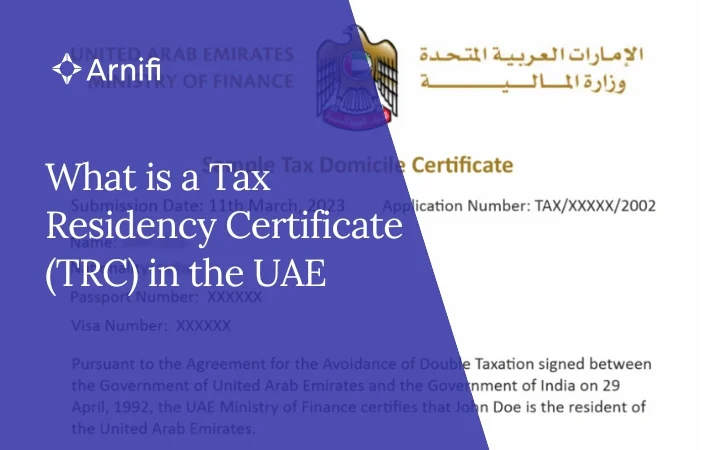Free Zone Corporate Tax Guide Available Now
by Shethana May 28, 2024  11 MIN READ
11 MIN READ

Key Facts!
- The Federal Tax Authority (FTA) has issued a guide on Corporate Tax for Free Zone Persons, outlining the application of Corporate Tax to Qualifying Free Zone Persons and the conditions required to benefit from a 0% Corporate Tax rate on Qualifying Income.
- The guide provides general guidance on the Corporate Tax Law, including the calculation of Corporate Tax, determination of Qualifying Income, and treatment of Permanent Establishments and income derived from immovable property and Qualifying Intellectual Property.
- Free Zones play a critical role in driving economic growth and transformation in the UAE, offering various benefits such as relaxed foreign ownership restrictions, streamlined administrative procedures, and modern infrastructure.
- The guide includes examples to assist businesses in understanding the Corporate Tax Law and its application to Free Zone Persons.
Introduction
The launch of the Free Zone Corporate Tax Guide by the UAE is a significant development for businesses operating within the country’s free zones. This guide aims to provide clarity and guidance on corporate tax obligations and benefits for free zone persons. Understanding the nuances of free zone taxation is crucial for compliance and strategic planning, making this resource invaluable for companies seeking to optimize their tax strategies within the UAE’s dynamic economic landscape.
Understanding Free Zone Corporate Taxation in the UAE
Navigating free zone corporate taxation in the UAE involves comprehending the distinct tax regime governing these zones. Free zone entities are subject to corporate tax laws differing from those applicable to mainland firms. Understanding the tax rates, qualifying activities, and exemptions is crucial for businesses operating in free zones. It is essential to grasp how the federal tax authority oversees these tax policies and how they impact the overall tax obligations of free zone persons.
The Basics of Free Zone Corporate Tax
Free zones in the UAE offer unique corporate tax advantages to qualifying entities. Understanding the basics of free zone corporate tax is crucial for businesses operating in these designated areas. Companies in free zones are subject to a specific corporate tax regime, with varying tax rates based on different qualifying criteria. It is essential for free zone persons to comprehend the application of corporate tax laws, ensuring compliance with the regulations set by the tax authority. A clear grasp of these fundamental principles helps businesses navigate tax obligations effectively.
How Free Zone Taxation Differs from Mainland Taxation
In the UAE, free zone taxation and mainland taxation showcase significant differences. Free zone entities in the UAE often benefit from tax exemptions and incentives not available to mainland businesses. They are subject to a unique tax regime distinct from mainland corporations. Understanding these variances is crucial for businesses operating in the UAE to navigate the diverse tax landscape effectively. Companies should consider these distinctions when formulating their tax strategies to optimize their financial structure within the country.
Key Benefits of Free Zone Corporate Tax Policies
Tax exemptions and incentives in free zones attract businesses due to the relaxed foreign ownership restrictions and lower corporate tax rates. These policies encourage foreign investment and contribute to economic growth in the UAE. The availability of additional legal entity forms and administrative procedures simplifies processes for qualifying free zone persons.
Tax Exemptions and Incentives for Businesses
Tax exemptions and incentives for businesses in UAE free zones play a pivotal role in attracting foreign investment. These benefits encompass tax holidays, exemptions on corporate and income taxes, and customs duty waivers. Additionally, special incentives like 100% foreign ownership and repatriation of capital and profits contribute to the allure of establishing businesses in free zones.
Impact on Foreign Investment and Economic Growth
Foreign investment and economic growth in free zones are profoundly impacted by corporate tax policies. The availability of tax exemptions and incentives attracts businesses, fostering increased foreign investment. This influx of investment fuels economic growth and enhances the overall competitiveness of free zones.
Navigating the Legal Framework of Free Zone Taxes
Regulatory bodies overseeing free zone taxation play a critical role in ensuring compliance. Understanding the compliance requirements for free zone companies is paramount. Navigating the legal framework involves familiarity with the federal tax authority’s guidelines and the application of corporate tax laws. Companies need to meet substance requirements and adhere to the regulations outlined by the tax authority. By following these procedures, businesses can operate smoothly within the free zone corporate tax regime. Compliance is key to avoiding penalties and maintaining a good standing within the free zone.
Regulatory Bodies and Their Roles
The regulatory bodies within the free zones play crucial roles in overseeing compliance with corporate tax laws. These bodies ensure that businesses adhere to the regulations set by the federal tax authority. By monitoring tax filings and enforcing regulations, they help maintain a fair and transparent tax regime. Their proactive involvement contributes to the efficient functioning of the free zone corporate tax system.
Compliance Requirements for Free Zone Companies
To operate smoothly within free zones, companies must adhere to specific compliance requirements set by the tax authority. Understanding the corporate tax laws, maintaining adequate financial records, and submitting timely financial statements are crucial. Free zone companies need to ensure they meet substance requirements, report taxable income accurately, and comply with all regulations to avoid penalties.
Taxation and Business Strategy in Free Zones

Strategic planning plays a pivotal role in enhancing tax efficiency within free zones. By aligning business strategies with the tax regime, companies can optimize their financial statements and overall tax liabilities. Case studies illustrating successful tax strategies provide valuable insights into effective approaches that businesses can adopt. Implementing robust tax planning measures ensures compliance with corporate tax laws while maximizing benefits from the free zone tax incentives.
Strategic Planning for Tax Efficiency
Strategic planning for tax efficiency involves optimizing tax liabilities through sound financial strategies tailored to the unique requirements of free zone corporate tax laws. This process includes leveraging available exemptions, incentives, and permissible deductions to minimize the overall tax burden on qualifying income. Achieving tax efficiency requires a proactive approach and continuous alignment with evolving tax laws and regulations.
Case Studies: Successful Tax Strategies in Free Zones
Case studies offer valuable insights into successful tax strategies in free zones. By analyzing real-world scenarios, businesses can learn from effective tax planning models. These studies showcase how companies optimize their tax positions within the free zone framework, utilizing incentives and exemptions for maximum benefit. Successful examples serve as benchmarks for other businesses aiming to enhance their tax planning in free zones.
Future Trends in Free Zone Taxation
Predictions on tax reforms in free zones anticipate greater transparency in corporate tax regulations and increased focus on tax planning for businesses. Adapting to global tax trends, the UAE might align its free zone tax policies with international standards to attract more foreign investment. Continuous updates in tax laws and compliance requirements are expected as free zones evolve into key economic hubs. Businesses should stay informed to leverage upcoming tax changes for strategic advantage.
Predictions on Tax Reforms and Their Implications
With the issuance of the Free Zone Corporate Tax guide, it is expected that there will be further tax reforms in the UAE. The government aims to create a more sustainable and robust tax regime that supports economic growth and attracts foreign investment. These reforms may include changes to the tax rates, the introduction of new tax incentives, and the expansion of the tax base. It is important for businesses operating in Free Zones to stay updated with these reforms and their implications. The Ministerial Decision on Free Zone Corporate Tax has already laid the foundation for a transparent and efficient tax system.
Adapting to Global Taxation Trends
As the UAE continues to position itself as a global business hub, it is crucial for businesses to adapt to global taxation trends. One of the key aspects of this adaptation is understanding the corporate tax rate and its implications. Free Zones, being an integral part of the UAE economy, play a critical role in driving economic growth and transformation. By offering relaxed foreign ownership restrictions, streamlined administrative procedures, and modern infrastructure, Free Zones attract businesses from around the world. The FTA’s website is a valuable resource for businesses operating in Free Zones, as it provides up-to-date information on tax regulations, guides, and implementing decisions.
Conclusion
In conclusion, understanding Free Zone corporate taxation in the UAE is crucial for businesses looking to maximize benefits and navigate legal frameworks efficiently. By exploring tax exemptions, incentives, and compliance requirements, companies can strategically plan for tax efficiency and adapt to future trends in taxation. This guide provides insights into the impact on foreign investment, economic growth, and key benefits of Free Zone tax policies. Stay informed about current tax rates, VAT implications, and reporting obligations to make informed decisions that align with your business strategy. Navigating Free Zone taxes effectively can contribute significantly to your overall business success.
About Arnifi
Arnifi is digital first Corporate service provider helping companies enter the Middle East region, starting with UAE and Saudi Arabia markets. Founded and backed by professionals from Amazon, Souq and other large companies operating in KSA – the team understands what it takes to succeed as a startup in both UAE and Saudi Arabian markets, apart from going through the setup process multiple times. Arnifi will provide a truly digital experience to entry and scale up of companies both UAE and Saudi Arabia. Discover tailored solutions and strategic partnerships that propel your business forward. Check out at – www.Arnifi.com for more details.
Frequently Asked Questions (FAQ)
What are the current corporate tax rates in UAE Free Zones?
Currently, the corporate tax rate for Qualifying Free Zone Persons in UAE Free Zones is 0%. This means that businesses operating in Free Zones and meeting the criteria outlined in the Free Zone Corporate Tax regime can enjoy a tax-free status on their Qualifying Income. The guide provides detailed information on the conditions for qualifying for this 0% tax rate and the activities considered as Qualifying Activities. It is important for businesses to understand these regulations to ensure compliance with the tax laws and maximize their tax benefits.
Can Free Zone companies benefit from double taxation treaties?
Free Zone companies can benefit from double taxation treaties signed by the UAE with other countries. These treaties are designed to avoid the double taxation of income earned in one country by residents of another country. The Federal Tax Authority (FTA) is responsible for administering these treaties and ensuring their implementation in the UAE. Businesses operating in Free Zones should consult the FTA or seek professional advice to determine their eligibility for the benefits provided by double taxation treaties. The guide on Free Zone Corporate Tax can also provide useful information on this topic.
How does VAT apply to Free Zone companies?
Value Added Tax (VAT) is applicable to Free Zone companies in the same way as it is applicable to other businesses in the UAE. VAT is a consumption tax that is levied on the supply of goods and services. Free Zone companies are required to register for VAT if their taxable supplies exceed the mandatory registration threshold. The guide on Free Zone Corporate Tax provides detailed information on the application of VAT to Free Zone companies, including the calculation of taxable income and the reporting obligations under the new tax regime. Businesses should consult the guide and the relevant tax authorities to ensure compliance with VAT regulations.
What are the reporting obligations for Free Zone companies under the new tax regime?
Under the new tax regime, Free Zone companies have reporting obligations that they must fulfill. These obligations include the preparation and submission of financial statements in accordance with the Corporate Tax Law. The guide on Free Zone Corporate Tax provides detailed information on the reporting requirements and the format of financial statements. It is important for businesses to comply with these obligations to avoid penalties and maintain good standing with the tax authorities. By understanding and fulfilling their reporting obligations, Free Zone companies can demonstrate transparency and accountability in their financial operations.
Are there any exceptions to the Free Zone no-tax policy?
While the Free Zone Corporate Tax regime offers a no-tax policy for Qualifying Free Zone Persons, there are certain exceptions to this policy. For example, if a Qualifying Free Zone Person operates through a Permanent Establishment outside the Free Zones or in a foreign country, the profits attributable to that Permanent Establishment will be subject to a 9% Corporate Tax rate. The guide on Free Zone Corporate Tax provides further details on these exceptions and the criteria for determining a Permanent Establishment. Businesses should carefully review the guide to understand any exceptions that may apply to their specific circumstances.
READ MORE: How to Qualify for VAT Exemption in UAE
READ MORE: Beginner’s Guide to Excise Tax in UAE
Read More
To help with global business expansion
make sure you choose us.
Get in touch with our team to find out about our approach
Response within 24 Hours




